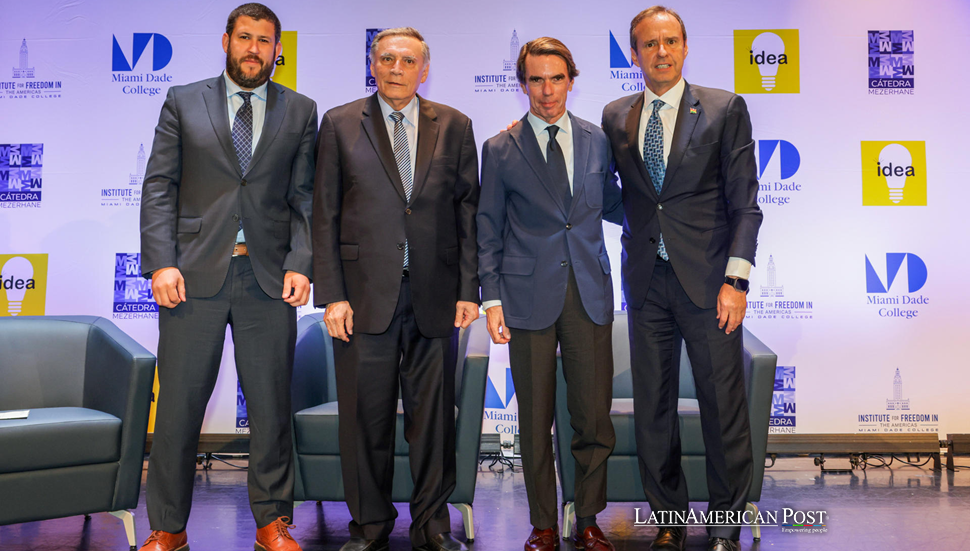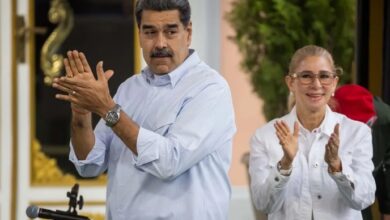United Front Needed to Prevent Venezuelan Maduro’s Continued Rule

A coalition of former Latin American and Spanish presidents is urging their governments to form a unified effort to prevent Venezuelan leader Nicolás Maduro from remaining in power after the fraudulent July election. Their argument: Maduro’s dictatorship threatens regional stability and democracy.
A Threat to Democracy
The ongoing crisis in Venezuela has become a focal point for Latin America, as Nicolás Maduro’s continued rule threatens the region’s democratic stability. During a recent forum in Miami, a group of former presidents from across Latin America and Spain gathered to issue a stark warning: allowing Maduro to remain in power following the fraudulent July presidential election would cement Venezuela’s slide into dictatorship and destabilize the region.
Former Colombian President Andrés Pastrana argued that Maduro’s hold on power is unconstitutional and illegitimate. “From the very moment that Nicolás Maduro was unconstitutionally proclaimed president, ignoring the true results of the July 28 elections, he automatically became a dictator,” Pastrana declared. His words reflect the growing consensus among former regional leaders that Maduro’s regime represents one of the most oppressive dictatorships in Latin American history.
Maduro’s electoral victory, which Venezuela’s regime-controlled National Electoral Council declared, has been widely disputed. Opposition leaders presented data from nearly 80% of voting stations, showing that opposition candidate Edmundo Gonzalez had won the election with about 68%, far ahead of Maduro’s alleged 52%. This has only fueled concerns that Maduro’s continued rule will further erode Venezuela’s democratic institutions and lead to increased authoritarianism.
The former presidents called for an end to the diplomatic double standards many countries have employed in dealing with Venezuela. They urged regional governments to openly reject Maduro’s presidency and work together to restore democratic order in the country. Pastrana warned, “Ignoring the popular will causes a rupture of the democratic order, and a rupture of the democratic order makes him a usurper of the office of the presidency.”
A Call for Collective Action
The former presidents were united in their call for a more robust international response to the crisis in Venezuela. Many emphasized that the region cannot afford to continue tolerating Maduro’s oppressive regime, which they argue not only violates human rights but also poses a broader threat to regional stability.
Former Bolivian President Jorge Quiroga highlighted the need for countries like the United States and the European Union to adopt a stricter stance toward authoritarian regimes in Latin America, particularly those in Venezuela, Nicaragua, and Cuba. “If immigration is a concern for the United States, then it should stop giving aspirins to lower the fever,” Quiroga said, urging the international community to address the root causes of the crisis rather than focusing solely on the symptoms. “The infection is the regimes of Maduro, Ortega, and the Castros.”
Quiroga’s argument is grounded in the fact that the exodus of Venezuelans fleeing their country has already reached crisis levels. If Maduro remains in power, this migration could intensify, with potentially destabilizing effects on neighboring countries.
The forum’s participants agreed that the region cannot continue treating Venezuela’s situation as an isolated issue. They emphasized that a united front, with solid support from the international community, is the best approach to preventing further harm to the region’s security and democratic values.
The Dangers of Diplomatic Inaction
One of the former presidents’ central points was the failure of the current diplomatic approach toward Venezuela. They argued that international attempts to maintain relations with Maduro’s government while criticizing his human rights abuses have done little to improve the situation. Instead, this approach has allowed Maduro to keep a grip on power while avoiding significant consequences.
As the forum’s participants emphasized, Maduro’s actions since the July election leave no room for compromise. The regime has suppressed opposition voices, carried out arbitrary detentions, and systematically violated the rights of Venezuelan citizens. It has become increasingly clear that diplomatic engagement with the Maduro government is not a viable option for restoring democracy in Venezuela.
One of the most potent voices in opposition to Maduro’s regime is María Corina Machado, a Venezuelan opposition leader who has faced numerous threats from the government. During the forum, Machado was praised for her courage and resilience, and the participants reaffirmed their admiration for her struggle. In a video presented at the event, Machado described the dire situation in Venezuela, stating, “Today we are in decisive hours. July 28 marked a before and after for Venezuela, and I dare say for the Western Hemisphere.”
Her nomination for the Nobel Peace Prize, supported by universities and international groups, underscores the global recognition of the severity of Venezuela’s crisis. The former presidents warned that without decisive international action, the situation in Venezuela will only worsen, and the regime’s continued grip on power will lead to further destabilization of the region.
Preventing a Regional Crisis
The implications of Maduro’s continued rule extend far beyond Venezuela’s borders. As former Spanish Prime Minister José María Aznar warned during the forum, if Maduro remains in power, the already-dire humanitarian crisis in Venezuela will lead to even greater waves of migration. Aznar pointed out that “Venezuela has a regime of terror,” where arbitrary detentions and violations of rights have become commonplace.
The forum participants stressed that Maduro’s government will not hesitate to encourage migration to relieve internal pressure, making it easier for Venezuelans to leave the country while avoiding responsibility for the crisis. However, this migration will destabilize neighboring countries, many of which are already grappling with their economic challenges.
The current situation significantly threatens the region’s democratic stability, and inaction will only exacerbate these problems. Allowing Maduro to remain in power could lead to increased political instability in countries like Colombia, Brazil, and Peru, which are already struggling to manage the influx of Venezuelan migrants. The former leaders stressed that the international community must act now to prevent this regional crisis from spiraling out of control.
Latin American countries and their international partners can mitigate the worst of these consequences by forming a unified front. The participants argued that the time for half-measures and diplomatic caution was over. The world must refuse to recognize Maduro’s illegitimate government and apply concerted pressure to force a change in Venezuela’s leadership.
Unity is the Best Path Forward
The former Latin American and Spanish presidents who gathered in Miami were clear in their message: the only way to ensure the region’s stability is by preventing Nicolás Maduro from continuing his illegitimate rule. His fraudulent election victory represents an attack on democracy, and his regime poses a direct threat to regional security.
The forum participants called for an end to failed diplomatic strategies and urged a united, decisive response. The international community must come together to reject Maduro’s presidency and restore democratic order in Venezuela. As former Bolivian President Jorge Quiroga put it, “If the world continues treating the symptoms instead of stopping the infection, the situation in Venezuela will only get worse.”
Also read: Colombia’s Battle Against Deforestation Stalls Due to Armed Groups
Allowing Maduro to remain in power will have devastating consequences for Venezuela and its neighbors. The region’s future depends on a unified effort to confront Maduro’s dictatorship and protect democratic stability across Latin America.




